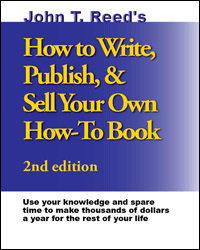Amazon will compete against you using your own proprietary data if you are a successful Amazon merchant
Posted by John Reed on
Copyright 2012 by John T. Reed
An author friend of mine once let Nolo Press distribute his book. It sold rather well. Nolo then came out with a book on the same subject to compete with it.
Later Nolo asked to distribute one of my books.
No, thanks.

Nowadays, Amazon lets all sorts of third-parties sell stuff through Amazon Marketplace.
Guess what?
By processing your sales, they see which of your products sell best at what volume and and what price point.
I presume Amazon gives you stats on your sales when you do that.
Do they give you all the stats? We have no way of knowing.
Do they look at your stats? What would stop them?
A 6/27/12 Wall Street Journal article said thousands of small merchants depend on Amazon to reach customers they could not otherwise reach, but that a few of them are now complaining that “Amazon sometimes eats their lunch.”
Not Amazon, the guys who got sued by Toys R Us for the same thing? You can see discussion of that in my article “Why I do not sell through Amazon.”
One Marketplace merchant was doing well selling NFL pillow pets. Then suddenly Amazon started selling the same product just before Christmas and featuring their competing product more prominently—in the “buy box”—than the merchant’s according to the Journal. The merchant’s sales plummeted by 80%. When he tried to cut his prices below Amazon’s they matched the cuts. Ultimately, they sold the pets for less than half of the merchant’s price.
It would appear that Amazon does not like high profit margins. Their business model is to be Mr. Cheap. So if you sell on their Marketplace, the unwritten law is apparently that you also have to be Mr. Cheap. If you do not, and you have a product that sells enough to attract their attention, they will undercut your price and thereby all but wipe out your sales of it.
They haf vays to make you kooperate—namely undercutting you.
Apparently, Amazon’s Marketplace works as long as you have no product Amazon decides to also offer
One way to deal with that is to be the sole supplier of the product. But that did not help my friend. Nolo created a product from scratch to compete with his. In the Journal example, the merchant was merely a middleman and Amazon was able to go around him to his supplier, probably getting a better wholesale price.
So if you are small and new to on-line marketing, I say, “Welcome to the NFL, rookie.”
You give a competitor access to your sales data at your peril. I suggest you try doing things the way I do which is explained in my book How to Write, Publish, and Sell your Own How-To Book. Some say it is a little old-fashioned and does not use the latest technology like ebooks and Amazon Marketplace.
I do use the latest technology—like the latest version of Adobe Creative Suite. My iMac is about a year old. My wife’s is months old.
But I am not so blinded by technology and the latest fashions—like Ebooks and Amazon Marketplace—that I lose sight of their strategic ramifications. I have a Harvard MBA. I did not spend two years busting my ass there learning all the nuances of business strategy to be naively turning over trade secrets and control of my distribution to competitors. See my web article about the importance of self-distribution.
It’s a jungle out there, especially on line. Be careful. Research before you leap.
Share this post
0 comment
